Servant Leadership and Authentic Leadership: Key Differences
VerifiedAdded on 2023/04/10
|9
|2630
|136
Essay
AI Summary
This essay provides a comprehensive comparison of servant leadership and authentic leadership, defining each style, outlining their distinct characteristics, and exploring their respective strengths and limitations. Servant leadership prioritizes the needs of followers, focusing on empowerment and development, while authentic leadership emphasizes building trust through genuine relationships and ethical conduct. The essay also examines the impact of both leadership styles on follower job satisfaction and organizational commitment, highlighting how servant leadership fosters trust and enhances leader-member exchange, and how authentic leadership promotes positive psychological states and strengthens follower engagement. Ultimately, the essay underscores the importance of both leadership approaches in creating positive organizational outcomes, fostering ethical behavior, and enhancing follower well-being. Desklib is your go-to platform for accessing similar solved assignments and study resources.
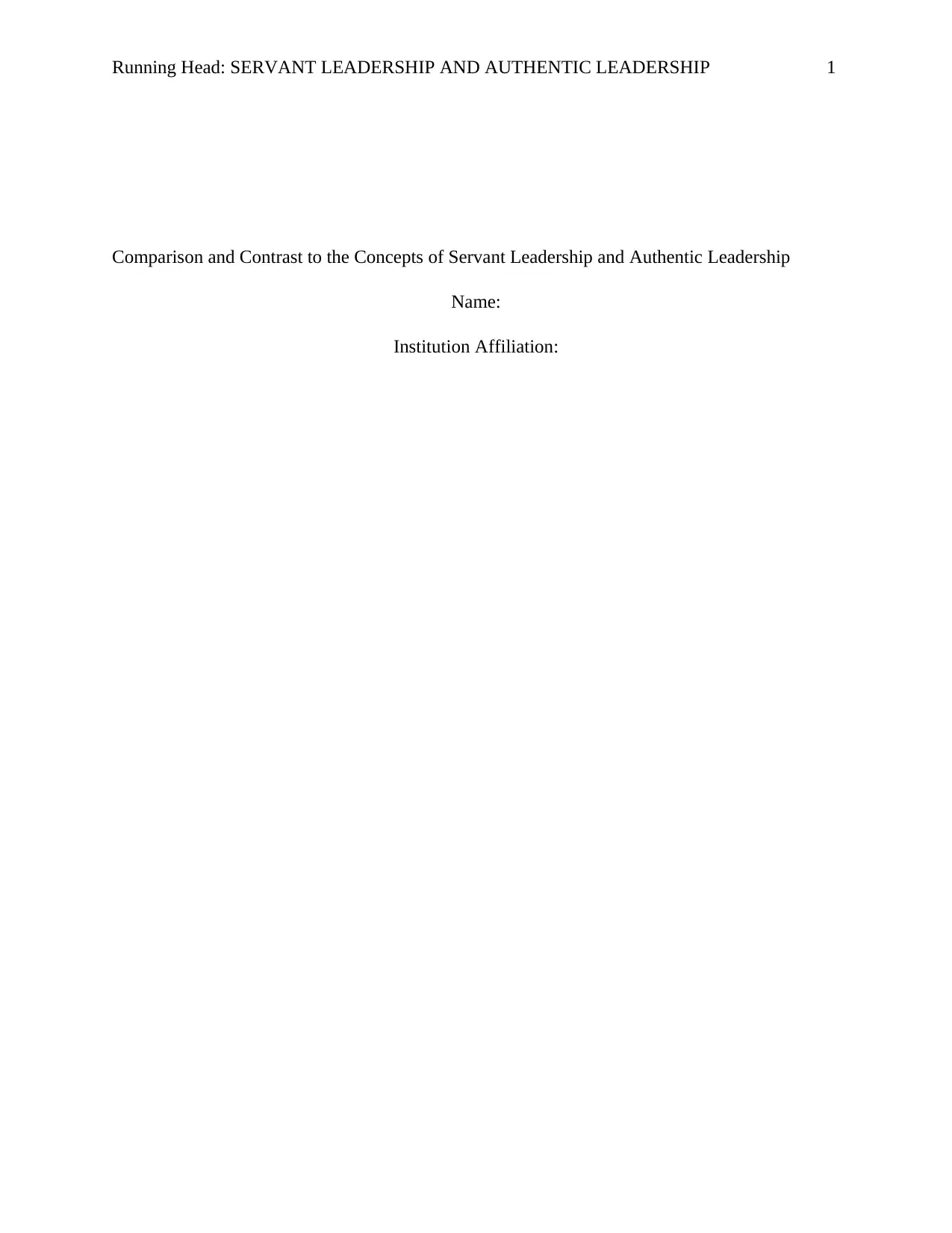
Running Head: SERVANT LEADERSHIP AND AUTHENTIC LEADERSHIP 1
Comparison and Contrast to the Concepts of Servant Leadership and Authentic Leadership
Name:
Institution Affiliation:
Comparison and Contrast to the Concepts of Servant Leadership and Authentic Leadership
Name:
Institution Affiliation:
Paraphrase This Document
Need a fresh take? Get an instant paraphrase of this document with our AI Paraphraser
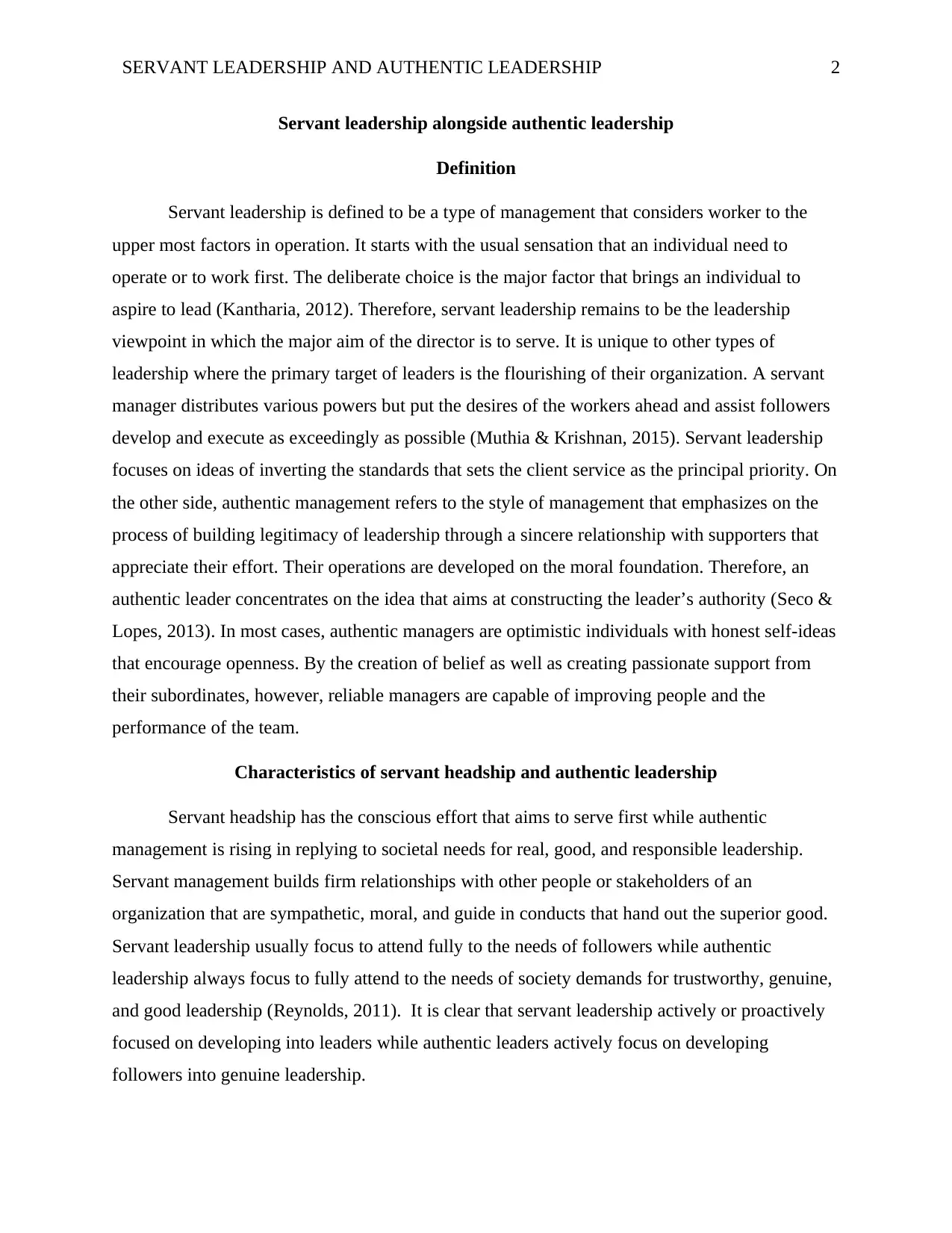
SERVANT LEADERSHIP AND AUTHENTIC LEADERSHIP 2
Servant leadership alongside authentic leadership
Definition
Servant leadership is defined to be a type of management that considers worker to the
upper most factors in operation. It starts with the usual sensation that an individual need to
operate or to work first. The deliberate choice is the major factor that brings an individual to
aspire to lead (Kantharia, 2012). Therefore, servant leadership remains to be the leadership
viewpoint in which the major aim of the director is to serve. It is unique to other types of
leadership where the primary target of leaders is the flourishing of their organization. A servant
manager distributes various powers but put the desires of the workers ahead and assist followers
develop and execute as exceedingly as possible (Muthia & Krishnan, 2015). Servant leadership
focuses on ideas of inverting the standards that sets the client service as the principal priority. On
the other side, authentic management refers to the style of management that emphasizes on the
process of building legitimacy of leadership through a sincere relationship with supporters that
appreciate their effort. Their operations are developed on the moral foundation. Therefore, an
authentic leader concentrates on the idea that aims at constructing the leader’s authority (Seco &
Lopes, 2013). In most cases, authentic managers are optimistic individuals with honest self-ideas
that encourage openness. By the creation of belief as well as creating passionate support from
their subordinates, however, reliable managers are capable of improving people and the
performance of the team.
Characteristics of servant headship and authentic leadership
Servant headship has the conscious effort that aims to serve first while authentic
management is rising in replying to societal needs for real, good, and responsible leadership.
Servant management builds firm relationships with other people or stakeholders of an
organization that are sympathetic, moral, and guide in conducts that hand out the superior good.
Servant leadership usually focus to attend fully to the needs of followers while authentic
leadership always focus to fully attend to the needs of society demands for trustworthy, genuine,
and good leadership (Reynolds, 2011). It is clear that servant leadership actively or proactively
focused on developing into leaders while authentic leaders actively focus on developing
followers into genuine leadership.
Servant leadership alongside authentic leadership
Definition
Servant leadership is defined to be a type of management that considers worker to the
upper most factors in operation. It starts with the usual sensation that an individual need to
operate or to work first. The deliberate choice is the major factor that brings an individual to
aspire to lead (Kantharia, 2012). Therefore, servant leadership remains to be the leadership
viewpoint in which the major aim of the director is to serve. It is unique to other types of
leadership where the primary target of leaders is the flourishing of their organization. A servant
manager distributes various powers but put the desires of the workers ahead and assist followers
develop and execute as exceedingly as possible (Muthia & Krishnan, 2015). Servant leadership
focuses on ideas of inverting the standards that sets the client service as the principal priority. On
the other side, authentic management refers to the style of management that emphasizes on the
process of building legitimacy of leadership through a sincere relationship with supporters that
appreciate their effort. Their operations are developed on the moral foundation. Therefore, an
authentic leader concentrates on the idea that aims at constructing the leader’s authority (Seco &
Lopes, 2013). In most cases, authentic managers are optimistic individuals with honest self-ideas
that encourage openness. By the creation of belief as well as creating passionate support from
their subordinates, however, reliable managers are capable of improving people and the
performance of the team.
Characteristics of servant headship and authentic leadership
Servant headship has the conscious effort that aims to serve first while authentic
management is rising in replying to societal needs for real, good, and responsible leadership.
Servant management builds firm relationships with other people or stakeholders of an
organization that are sympathetic, moral, and guide in conducts that hand out the superior good.
Servant leadership usually focus to attend fully to the needs of followers while authentic
leadership always focus to fully attend to the needs of society demands for trustworthy, genuine,
and good leadership (Reynolds, 2011). It is clear that servant leadership actively or proactively
focused on developing into leaders while authentic leaders actively focus on developing
followers into genuine leadership.
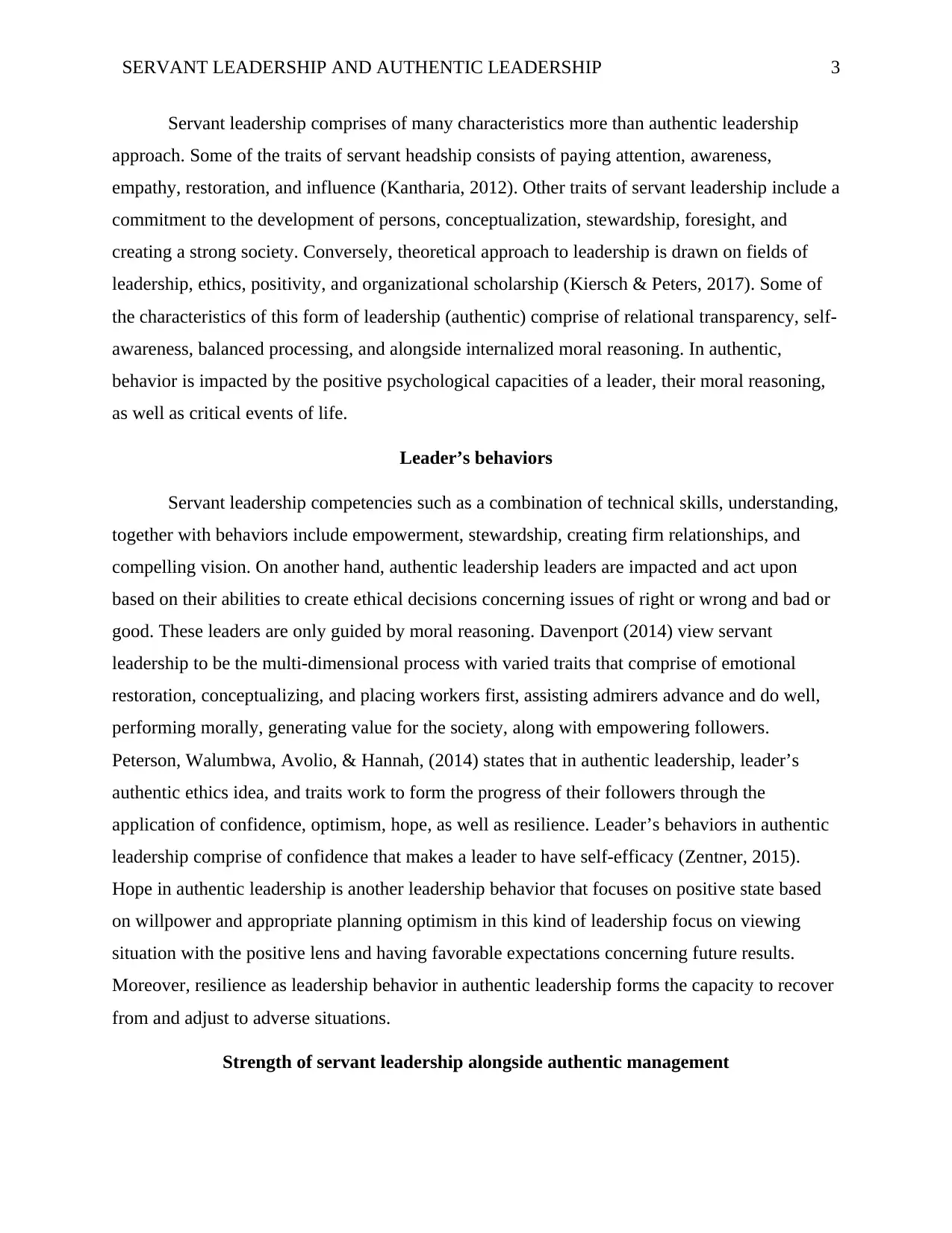
SERVANT LEADERSHIP AND AUTHENTIC LEADERSHIP 3
Servant leadership comprises of many characteristics more than authentic leadership
approach. Some of the traits of servant headship consists of paying attention, awareness,
empathy, restoration, and influence (Kantharia, 2012). Other traits of servant leadership include a
commitment to the development of persons, conceptualization, stewardship, foresight, and
creating a strong society. Conversely, theoretical approach to leadership is drawn on fields of
leadership, ethics, positivity, and organizational scholarship (Kiersch & Peters, 2017). Some of
the characteristics of this form of leadership (authentic) comprise of relational transparency, self-
awareness, balanced processing, and alongside internalized moral reasoning. In authentic,
behavior is impacted by the positive psychological capacities of a leader, their moral reasoning,
as well as critical events of life.
Leader’s behaviors
Servant leadership competencies such as a combination of technical skills, understanding,
together with behaviors include empowerment, stewardship, creating firm relationships, and
compelling vision. On another hand, authentic leadership leaders are impacted and act upon
based on their abilities to create ethical decisions concerning issues of right or wrong and bad or
good. These leaders are only guided by moral reasoning. Davenport (2014) view servant
leadership to be the multi-dimensional process with varied traits that comprise of emotional
restoration, conceptualizing, and placing workers first, assisting admirers advance and do well,
performing morally, generating value for the society, along with empowering followers.
Peterson, Walumbwa, Avolio, & Hannah, (2014) states that in authentic leadership, leader’s
authentic ethics idea, and traits work to form the progress of their followers through the
application of confidence, optimism, hope, as well as resilience. Leader’s behaviors in authentic
leadership comprise of confidence that makes a leader to have self-efficacy (Zentner, 2015).
Hope in authentic leadership is another leadership behavior that focuses on positive state based
on willpower and appropriate planning optimism in this kind of leadership focus on viewing
situation with the positive lens and having favorable expectations concerning future results.
Moreover, resilience as leadership behavior in authentic leadership forms the capacity to recover
from and adjust to adverse situations.
Strength of servant leadership alongside authentic management
Servant leadership comprises of many characteristics more than authentic leadership
approach. Some of the traits of servant headship consists of paying attention, awareness,
empathy, restoration, and influence (Kantharia, 2012). Other traits of servant leadership include a
commitment to the development of persons, conceptualization, stewardship, foresight, and
creating a strong society. Conversely, theoretical approach to leadership is drawn on fields of
leadership, ethics, positivity, and organizational scholarship (Kiersch & Peters, 2017). Some of
the characteristics of this form of leadership (authentic) comprise of relational transparency, self-
awareness, balanced processing, and alongside internalized moral reasoning. In authentic,
behavior is impacted by the positive psychological capacities of a leader, their moral reasoning,
as well as critical events of life.
Leader’s behaviors
Servant leadership competencies such as a combination of technical skills, understanding,
together with behaviors include empowerment, stewardship, creating firm relationships, and
compelling vision. On another hand, authentic leadership leaders are impacted and act upon
based on their abilities to create ethical decisions concerning issues of right or wrong and bad or
good. These leaders are only guided by moral reasoning. Davenport (2014) view servant
leadership to be the multi-dimensional process with varied traits that comprise of emotional
restoration, conceptualizing, and placing workers first, assisting admirers advance and do well,
performing morally, generating value for the society, along with empowering followers.
Peterson, Walumbwa, Avolio, & Hannah, (2014) states that in authentic leadership, leader’s
authentic ethics idea, and traits work to form the progress of their followers through the
application of confidence, optimism, hope, as well as resilience. Leader’s behaviors in authentic
leadership comprise of confidence that makes a leader to have self-efficacy (Zentner, 2015).
Hope in authentic leadership is another leadership behavior that focuses on positive state based
on willpower and appropriate planning optimism in this kind of leadership focus on viewing
situation with the positive lens and having favorable expectations concerning future results.
Moreover, resilience as leadership behavior in authentic leadership forms the capacity to recover
from and adjust to adverse situations.
Strength of servant leadership alongside authentic management
⊘ This is a preview!⊘
Do you want full access?
Subscribe today to unlock all pages.

Trusted by 1+ million students worldwide
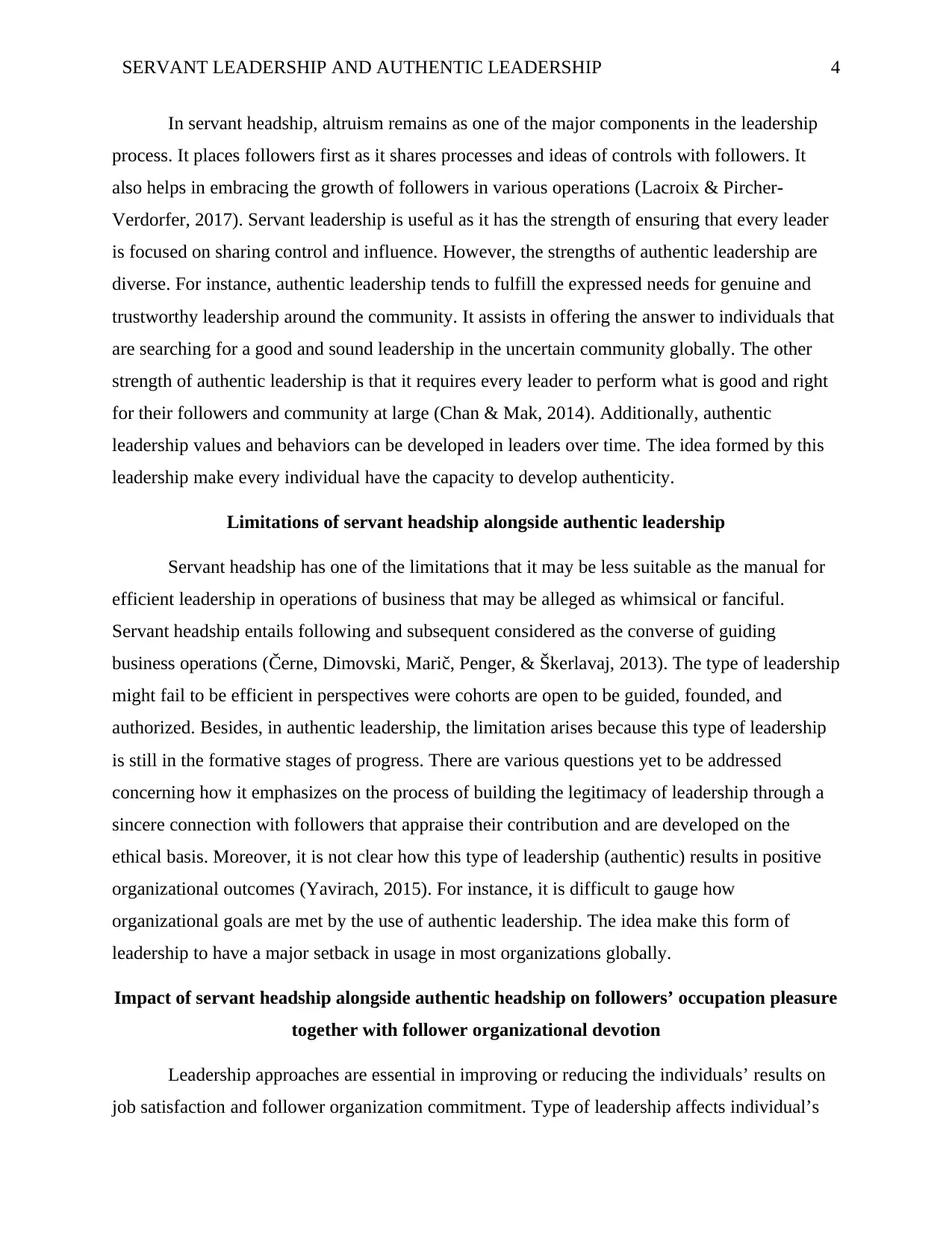
SERVANT LEADERSHIP AND AUTHENTIC LEADERSHIP 4
In servant headship, altruism remains as one of the major components in the leadership
process. It places followers first as it shares processes and ideas of controls with followers. It
also helps in embracing the growth of followers in various operations (Lacroix & Pircher-
Verdorfer, 2017). Servant leadership is useful as it has the strength of ensuring that every leader
is focused on sharing control and influence. However, the strengths of authentic leadership are
diverse. For instance, authentic leadership tends to fulfill the expressed needs for genuine and
trustworthy leadership around the community. It assists in offering the answer to individuals that
are searching for a good and sound leadership in the uncertain community globally. The other
strength of authentic leadership is that it requires every leader to perform what is good and right
for their followers and community at large (Chan & Mak, 2014). Additionally, authentic
leadership values and behaviors can be developed in leaders over time. The idea formed by this
leadership make every individual have the capacity to develop authenticity.
Limitations of servant headship alongside authentic leadership
Servant headship has one of the limitations that it may be less suitable as the manual for
efficient leadership in operations of business that may be alleged as whimsical or fanciful.
Servant headship entails following and subsequent considered as the converse of guiding
business operations (Černe, Dimovski, Marič, Penger, & Škerlavaj, 2013). The type of leadership
might fail to be efficient in perspectives were cohorts are open to be guided, founded, and
authorized. Besides, in authentic leadership, the limitation arises because this type of leadership
is still in the formative stages of progress. There are various questions yet to be addressed
concerning how it emphasizes on the process of building the legitimacy of leadership through a
sincere connection with followers that appraise their contribution and are developed on the
ethical basis. Moreover, it is not clear how this type of leadership (authentic) results in positive
organizational outcomes (Yavirach, 2015). For instance, it is difficult to gauge how
organizational goals are met by the use of authentic leadership. The idea make this form of
leadership to have a major setback in usage in most organizations globally.
Impact of servant headship alongside authentic headship on followers’ occupation pleasure
together with follower organizational devotion
Leadership approaches are essential in improving or reducing the individuals’ results on
job satisfaction and follower organization commitment. Type of leadership affects individual’s
In servant headship, altruism remains as one of the major components in the leadership
process. It places followers first as it shares processes and ideas of controls with followers. It
also helps in embracing the growth of followers in various operations (Lacroix & Pircher-
Verdorfer, 2017). Servant leadership is useful as it has the strength of ensuring that every leader
is focused on sharing control and influence. However, the strengths of authentic leadership are
diverse. For instance, authentic leadership tends to fulfill the expressed needs for genuine and
trustworthy leadership around the community. It assists in offering the answer to individuals that
are searching for a good and sound leadership in the uncertain community globally. The other
strength of authentic leadership is that it requires every leader to perform what is good and right
for their followers and community at large (Chan & Mak, 2014). Additionally, authentic
leadership values and behaviors can be developed in leaders over time. The idea formed by this
leadership make every individual have the capacity to develop authenticity.
Limitations of servant headship alongside authentic leadership
Servant headship has one of the limitations that it may be less suitable as the manual for
efficient leadership in operations of business that may be alleged as whimsical or fanciful.
Servant headship entails following and subsequent considered as the converse of guiding
business operations (Černe, Dimovski, Marič, Penger, & Škerlavaj, 2013). The type of leadership
might fail to be efficient in perspectives were cohorts are open to be guided, founded, and
authorized. Besides, in authentic leadership, the limitation arises because this type of leadership
is still in the formative stages of progress. There are various questions yet to be addressed
concerning how it emphasizes on the process of building the legitimacy of leadership through a
sincere connection with followers that appraise their contribution and are developed on the
ethical basis. Moreover, it is not clear how this type of leadership (authentic) results in positive
organizational outcomes (Yavirach, 2015). For instance, it is difficult to gauge how
organizational goals are met by the use of authentic leadership. The idea make this form of
leadership to have a major setback in usage in most organizations globally.
Impact of servant headship alongside authentic headship on followers’ occupation pleasure
together with follower organizational devotion
Leadership approaches are essential in improving or reducing the individuals’ results on
job satisfaction and follower organization commitment. Type of leadership affects individual’s
Paraphrase This Document
Need a fresh take? Get an instant paraphrase of this document with our AI Paraphraser
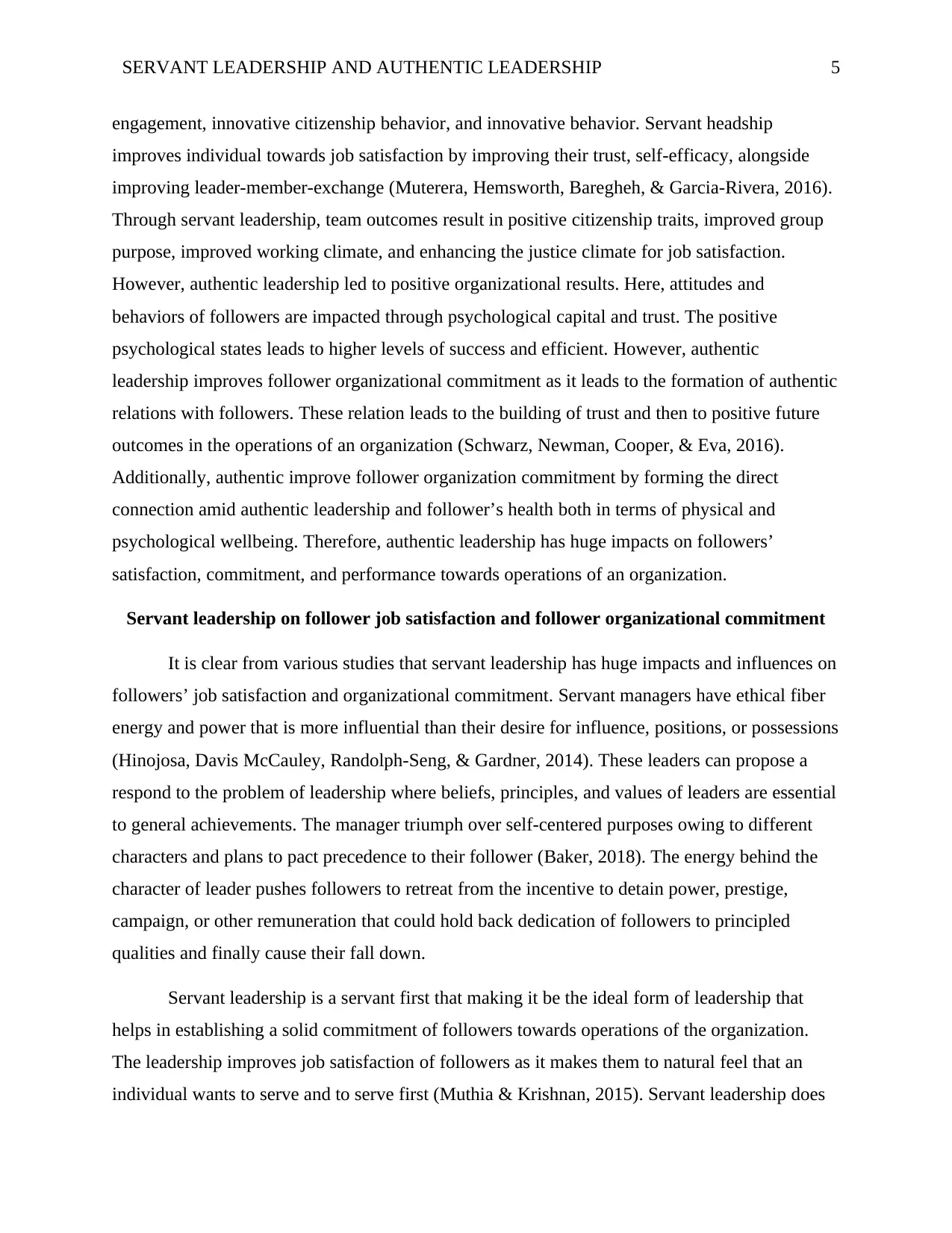
SERVANT LEADERSHIP AND AUTHENTIC LEADERSHIP 5
engagement, innovative citizenship behavior, and innovative behavior. Servant headship
improves individual towards job satisfaction by improving their trust, self-efficacy, alongside
improving leader-member-exchange (Muterera, Hemsworth, Baregheh, & Garcia-Rivera, 2016).
Through servant leadership, team outcomes result in positive citizenship traits, improved group
purpose, improved working climate, and enhancing the justice climate for job satisfaction.
However, authentic leadership led to positive organizational results. Here, attitudes and
behaviors of followers are impacted through psychological capital and trust. The positive
psychological states leads to higher levels of success and efficient. However, authentic
leadership improves follower organizational commitment as it leads to the formation of authentic
relations with followers. These relation leads to the building of trust and then to positive future
outcomes in the operations of an organization (Schwarz, Newman, Cooper, & Eva, 2016).
Additionally, authentic improve follower organization commitment by forming the direct
connection amid authentic leadership and follower’s health both in terms of physical and
psychological wellbeing. Therefore, authentic leadership has huge impacts on followers’
satisfaction, commitment, and performance towards operations of an organization.
Servant leadership on follower job satisfaction and follower organizational commitment
It is clear from various studies that servant leadership has huge impacts and influences on
followers’ job satisfaction and organizational commitment. Servant managers have ethical fiber
energy and power that is more influential than their desire for influence, positions, or possessions
(Hinojosa, Davis McCauley, Randolph-Seng, & Gardner, 2014). These leaders can propose a
respond to the problem of leadership where beliefs, principles, and values of leaders are essential
to general achievements. The manager triumph over self-centered purposes owing to different
characters and plans to pact precedence to their follower (Baker, 2018). The energy behind the
character of leader pushes followers to retreat from the incentive to detain power, prestige,
campaign, or other remuneration that could hold back dedication of followers to principled
qualities and finally cause their fall down.
Servant leadership is a servant first that making it be the ideal form of leadership that
helps in establishing a solid commitment of followers towards operations of the organization.
The leadership improves job satisfaction of followers as it makes them to natural feel that an
individual wants to serve and to serve first (Muthia & Krishnan, 2015). Servant leadership does
engagement, innovative citizenship behavior, and innovative behavior. Servant headship
improves individual towards job satisfaction by improving their trust, self-efficacy, alongside
improving leader-member-exchange (Muterera, Hemsworth, Baregheh, & Garcia-Rivera, 2016).
Through servant leadership, team outcomes result in positive citizenship traits, improved group
purpose, improved working climate, and enhancing the justice climate for job satisfaction.
However, authentic leadership led to positive organizational results. Here, attitudes and
behaviors of followers are impacted through psychological capital and trust. The positive
psychological states leads to higher levels of success and efficient. However, authentic
leadership improves follower organizational commitment as it leads to the formation of authentic
relations with followers. These relation leads to the building of trust and then to positive future
outcomes in the operations of an organization (Schwarz, Newman, Cooper, & Eva, 2016).
Additionally, authentic improve follower organization commitment by forming the direct
connection amid authentic leadership and follower’s health both in terms of physical and
psychological wellbeing. Therefore, authentic leadership has huge impacts on followers’
satisfaction, commitment, and performance towards operations of an organization.
Servant leadership on follower job satisfaction and follower organizational commitment
It is clear from various studies that servant leadership has huge impacts and influences on
followers’ job satisfaction and organizational commitment. Servant managers have ethical fiber
energy and power that is more influential than their desire for influence, positions, or possessions
(Hinojosa, Davis McCauley, Randolph-Seng, & Gardner, 2014). These leaders can propose a
respond to the problem of leadership where beliefs, principles, and values of leaders are essential
to general achievements. The manager triumph over self-centered purposes owing to different
characters and plans to pact precedence to their follower (Baker, 2018). The energy behind the
character of leader pushes followers to retreat from the incentive to detain power, prestige,
campaign, or other remuneration that could hold back dedication of followers to principled
qualities and finally cause their fall down.
Servant leadership is a servant first that making it be the ideal form of leadership that
helps in establishing a solid commitment of followers towards operations of the organization.
The leadership improves job satisfaction of followers as it makes them to natural feel that an
individual wants to serve and to serve first (Muthia & Krishnan, 2015). Servant leadership does
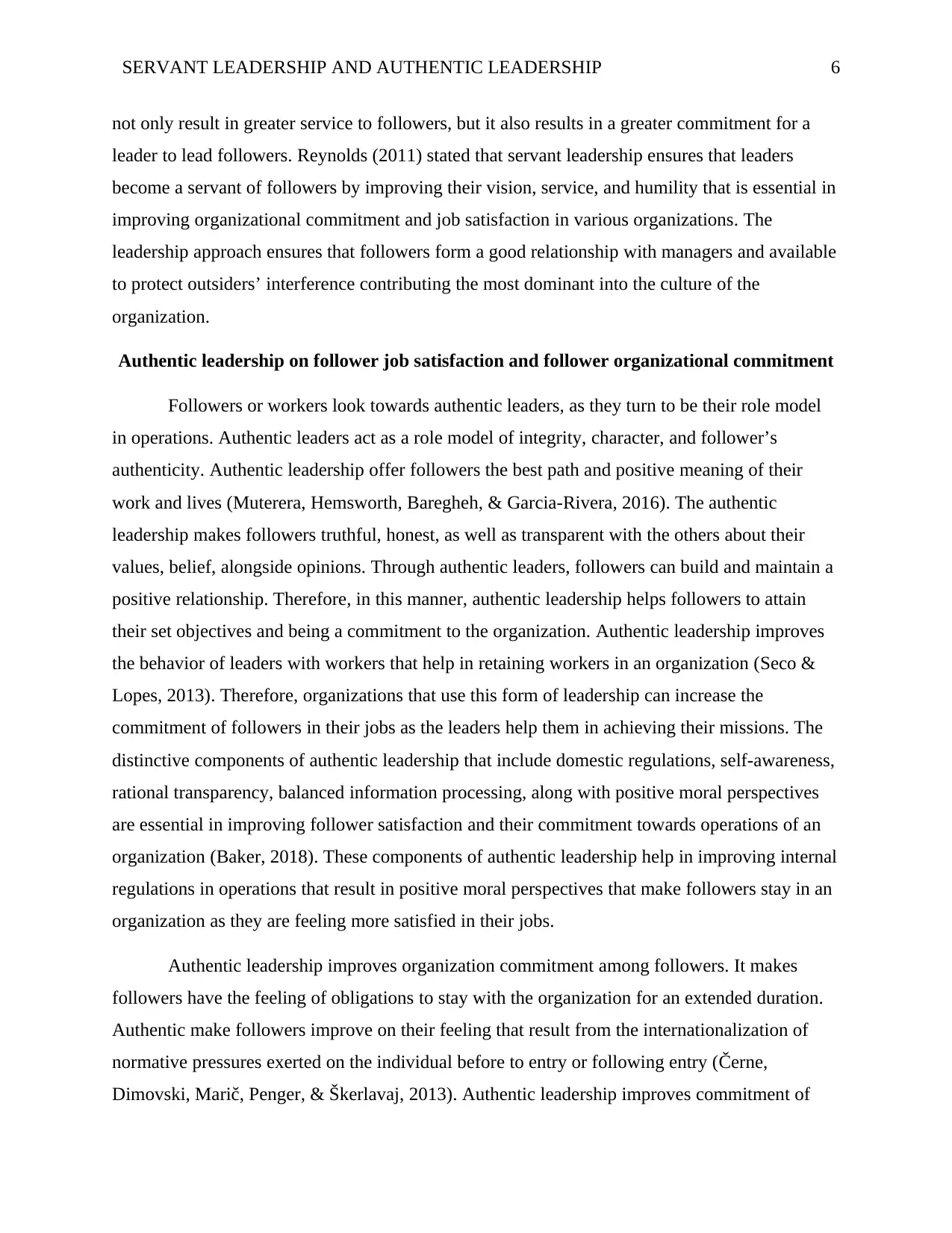
SERVANT LEADERSHIP AND AUTHENTIC LEADERSHIP 6
not only result in greater service to followers, but it also results in a greater commitment for a
leader to lead followers. Reynolds (2011) stated that servant leadership ensures that leaders
become a servant of followers by improving their vision, service, and humility that is essential in
improving organizational commitment and job satisfaction in various organizations. The
leadership approach ensures that followers form a good relationship with managers and available
to protect outsiders’ interference contributing the most dominant into the culture of the
organization.
Authentic leadership on follower job satisfaction and follower organizational commitment
Followers or workers look towards authentic leaders, as they turn to be their role model
in operations. Authentic leaders act as a role model of integrity, character, and follower’s
authenticity. Authentic leadership offer followers the best path and positive meaning of their
work and lives (Muterera, Hemsworth, Baregheh, & Garcia-Rivera, 2016). The authentic
leadership makes followers truthful, honest, as well as transparent with the others about their
values, belief, alongside opinions. Through authentic leaders, followers can build and maintain a
positive relationship. Therefore, in this manner, authentic leadership helps followers to attain
their set objectives and being a commitment to the organization. Authentic leadership improves
the behavior of leaders with workers that help in retaining workers in an organization (Seco &
Lopes, 2013). Therefore, organizations that use this form of leadership can increase the
commitment of followers in their jobs as the leaders help them in achieving their missions. The
distinctive components of authentic leadership that include domestic regulations, self-awareness,
rational transparency, balanced information processing, along with positive moral perspectives
are essential in improving follower satisfaction and their commitment towards operations of an
organization (Baker, 2018). These components of authentic leadership help in improving internal
regulations in operations that result in positive moral perspectives that make followers stay in an
organization as they are feeling more satisfied in their jobs.
Authentic leadership improves organization commitment among followers. It makes
followers have the feeling of obligations to stay with the organization for an extended duration.
Authentic make followers improve on their feeling that result from the internationalization of
normative pressures exerted on the individual before to entry or following entry (Černe,
Dimovski, Marič, Penger, & Škerlavaj, 2013). Authentic leadership improves commitment of
not only result in greater service to followers, but it also results in a greater commitment for a
leader to lead followers. Reynolds (2011) stated that servant leadership ensures that leaders
become a servant of followers by improving their vision, service, and humility that is essential in
improving organizational commitment and job satisfaction in various organizations. The
leadership approach ensures that followers form a good relationship with managers and available
to protect outsiders’ interference contributing the most dominant into the culture of the
organization.
Authentic leadership on follower job satisfaction and follower organizational commitment
Followers or workers look towards authentic leaders, as they turn to be their role model
in operations. Authentic leaders act as a role model of integrity, character, and follower’s
authenticity. Authentic leadership offer followers the best path and positive meaning of their
work and lives (Muterera, Hemsworth, Baregheh, & Garcia-Rivera, 2016). The authentic
leadership makes followers truthful, honest, as well as transparent with the others about their
values, belief, alongside opinions. Through authentic leaders, followers can build and maintain a
positive relationship. Therefore, in this manner, authentic leadership helps followers to attain
their set objectives and being a commitment to the organization. Authentic leadership improves
the behavior of leaders with workers that help in retaining workers in an organization (Seco &
Lopes, 2013). Therefore, organizations that use this form of leadership can increase the
commitment of followers in their jobs as the leaders help them in achieving their missions. The
distinctive components of authentic leadership that include domestic regulations, self-awareness,
rational transparency, balanced information processing, along with positive moral perspectives
are essential in improving follower satisfaction and their commitment towards operations of an
organization (Baker, 2018). These components of authentic leadership help in improving internal
regulations in operations that result in positive moral perspectives that make followers stay in an
organization as they are feeling more satisfied in their jobs.
Authentic leadership improves organization commitment among followers. It makes
followers have the feeling of obligations to stay with the organization for an extended duration.
Authentic make followers improve on their feeling that result from the internationalization of
normative pressures exerted on the individual before to entry or following entry (Černe,
Dimovski, Marič, Penger, & Škerlavaj, 2013). Authentic leadership improves commitment of
⊘ This is a preview!⊘
Do you want full access?
Subscribe today to unlock all pages.

Trusted by 1+ million students worldwide
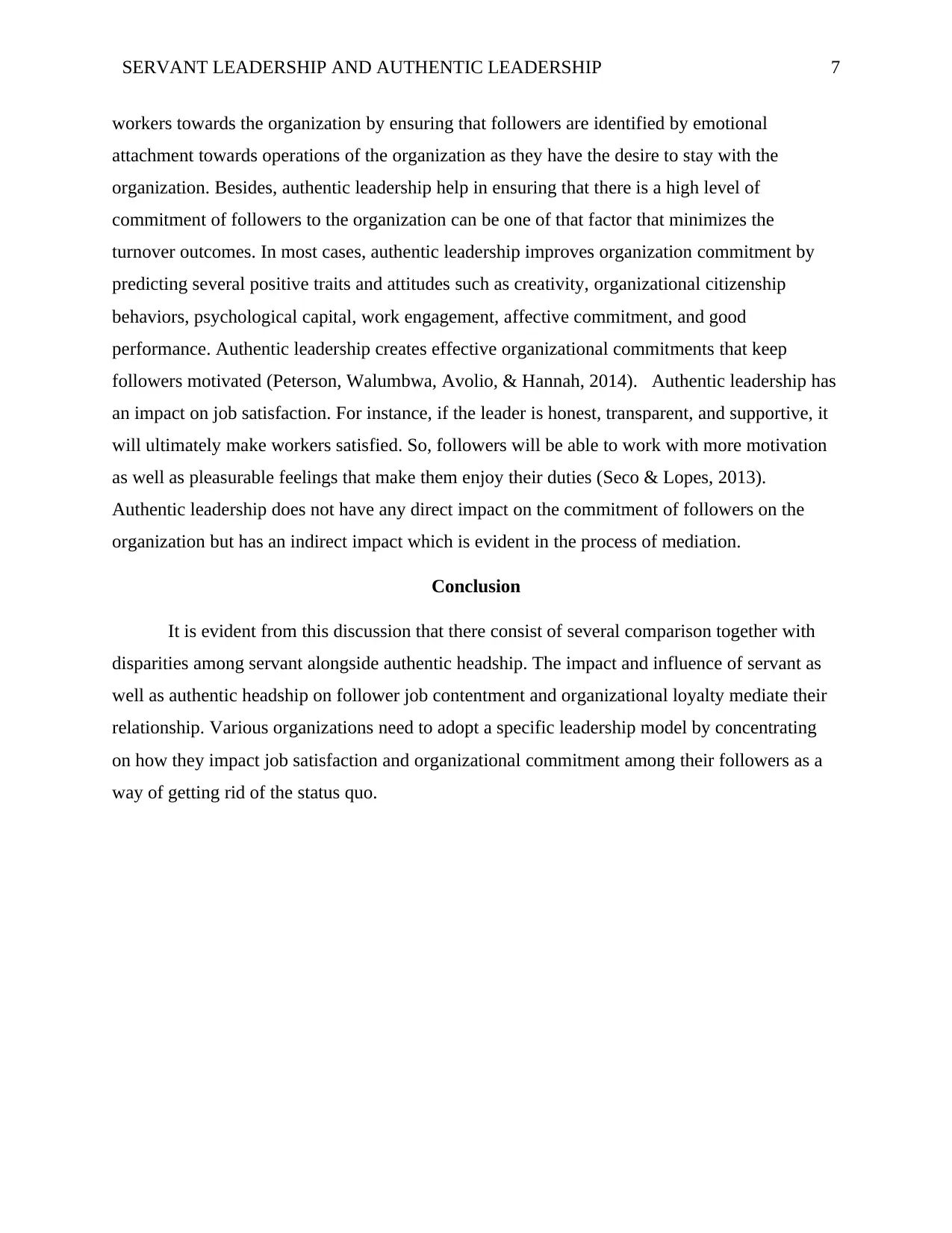
SERVANT LEADERSHIP AND AUTHENTIC LEADERSHIP 7
workers towards the organization by ensuring that followers are identified by emotional
attachment towards operations of the organization as they have the desire to stay with the
organization. Besides, authentic leadership help in ensuring that there is a high level of
commitment of followers to the organization can be one of that factor that minimizes the
turnover outcomes. In most cases, authentic leadership improves organization commitment by
predicting several positive traits and attitudes such as creativity, organizational citizenship
behaviors, psychological capital, work engagement, affective commitment, and good
performance. Authentic leadership creates effective organizational commitments that keep
followers motivated (Peterson, Walumbwa, Avolio, & Hannah, 2014). Authentic leadership has
an impact on job satisfaction. For instance, if the leader is honest, transparent, and supportive, it
will ultimately make workers satisfied. So, followers will be able to work with more motivation
as well as pleasurable feelings that make them enjoy their duties (Seco & Lopes, 2013).
Authentic leadership does not have any direct impact on the commitment of followers on the
organization but has an indirect impact which is evident in the process of mediation.
Conclusion
It is evident from this discussion that there consist of several comparison together with
disparities among servant alongside authentic headship. The impact and influence of servant as
well as authentic headship on follower job contentment and organizational loyalty mediate their
relationship. Various organizations need to adopt a specific leadership model by concentrating
on how they impact job satisfaction and organizational commitment among their followers as a
way of getting rid of the status quo.
workers towards the organization by ensuring that followers are identified by emotional
attachment towards operations of the organization as they have the desire to stay with the
organization. Besides, authentic leadership help in ensuring that there is a high level of
commitment of followers to the organization can be one of that factor that minimizes the
turnover outcomes. In most cases, authentic leadership improves organization commitment by
predicting several positive traits and attitudes such as creativity, organizational citizenship
behaviors, psychological capital, work engagement, affective commitment, and good
performance. Authentic leadership creates effective organizational commitments that keep
followers motivated (Peterson, Walumbwa, Avolio, & Hannah, 2014). Authentic leadership has
an impact on job satisfaction. For instance, if the leader is honest, transparent, and supportive, it
will ultimately make workers satisfied. So, followers will be able to work with more motivation
as well as pleasurable feelings that make them enjoy their duties (Seco & Lopes, 2013).
Authentic leadership does not have any direct impact on the commitment of followers on the
organization but has an indirect impact which is evident in the process of mediation.
Conclusion
It is evident from this discussion that there consist of several comparison together with
disparities among servant alongside authentic headship. The impact and influence of servant as
well as authentic headship on follower job contentment and organizational loyalty mediate their
relationship. Various organizations need to adopt a specific leadership model by concentrating
on how they impact job satisfaction and organizational commitment among their followers as a
way of getting rid of the status quo.
Paraphrase This Document
Need a fresh take? Get an instant paraphrase of this document with our AI Paraphraser
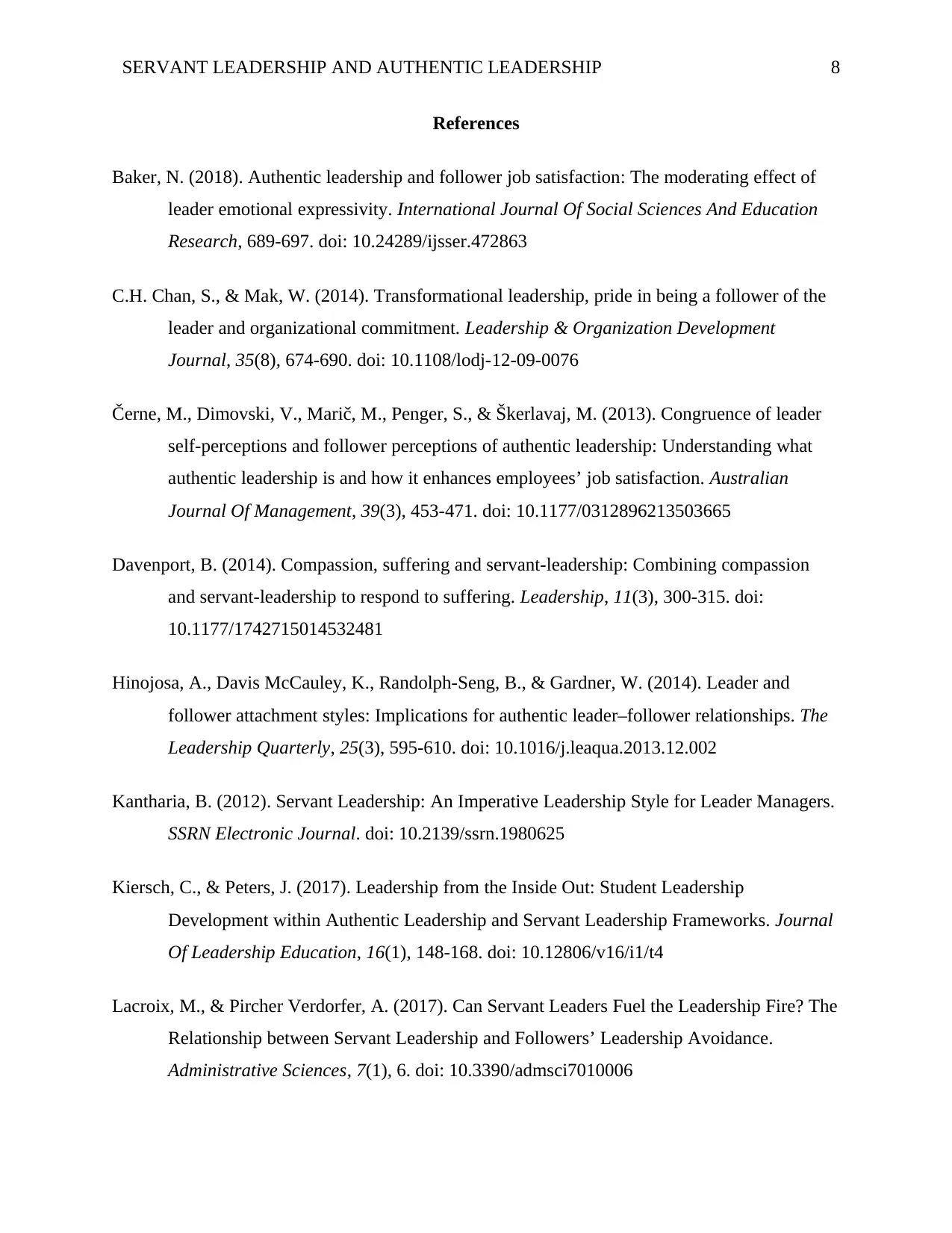
SERVANT LEADERSHIP AND AUTHENTIC LEADERSHIP 8
References
Baker, N. (2018). Authentic leadership and follower job satisfaction: The moderating effect of
leader emotional expressivity. International Journal Of Social Sciences And Education
Research, 689-697. doi: 10.24289/ijsser.472863
C.H. Chan, S., & Mak, W. (2014). Transformational leadership, pride in being a follower of the
leader and organizational commitment. Leadership & Organization Development
Journal, 35(8), 674-690. doi: 10.1108/lodj-12-09-0076
Černe, M., Dimovski, V., Marič, M., Penger, S., & Škerlavaj, M. (2013). Congruence of leader
self-perceptions and follower perceptions of authentic leadership: Understanding what
authentic leadership is and how it enhances employees’ job satisfaction. Australian
Journal Of Management, 39(3), 453-471. doi: 10.1177/0312896213503665
Davenport, B. (2014). Compassion, suffering and servant-leadership: Combining compassion
and servant-leadership to respond to suffering. Leadership, 11(3), 300-315. doi:
10.1177/1742715014532481
Hinojosa, A., Davis McCauley, K., Randolph-Seng, B., & Gardner, W. (2014). Leader and
follower attachment styles: Implications for authentic leader–follower relationships. The
Leadership Quarterly, 25(3), 595-610. doi: 10.1016/j.leaqua.2013.12.002
Kantharia, B. (2012). Servant Leadership: An Imperative Leadership Style for Leader Managers.
SSRN Electronic Journal. doi: 10.2139/ssrn.1980625
Kiersch, C., & Peters, J. (2017). Leadership from the Inside Out: Student Leadership
Development within Authentic Leadership and Servant Leadership Frameworks. Journal
Of Leadership Education, 16(1), 148-168. doi: 10.12806/v16/i1/t4
Lacroix, M., & Pircher Verdorfer, A. (2017). Can Servant Leaders Fuel the Leadership Fire? The
Relationship between Servant Leadership and Followers’ Leadership Avoidance.
Administrative Sciences, 7(1), 6. doi: 10.3390/admsci7010006
References
Baker, N. (2018). Authentic leadership and follower job satisfaction: The moderating effect of
leader emotional expressivity. International Journal Of Social Sciences And Education
Research, 689-697. doi: 10.24289/ijsser.472863
C.H. Chan, S., & Mak, W. (2014). Transformational leadership, pride in being a follower of the
leader and organizational commitment. Leadership & Organization Development
Journal, 35(8), 674-690. doi: 10.1108/lodj-12-09-0076
Černe, M., Dimovski, V., Marič, M., Penger, S., & Škerlavaj, M. (2013). Congruence of leader
self-perceptions and follower perceptions of authentic leadership: Understanding what
authentic leadership is and how it enhances employees’ job satisfaction. Australian
Journal Of Management, 39(3), 453-471. doi: 10.1177/0312896213503665
Davenport, B. (2014). Compassion, suffering and servant-leadership: Combining compassion
and servant-leadership to respond to suffering. Leadership, 11(3), 300-315. doi:
10.1177/1742715014532481
Hinojosa, A., Davis McCauley, K., Randolph-Seng, B., & Gardner, W. (2014). Leader and
follower attachment styles: Implications for authentic leader–follower relationships. The
Leadership Quarterly, 25(3), 595-610. doi: 10.1016/j.leaqua.2013.12.002
Kantharia, B. (2012). Servant Leadership: An Imperative Leadership Style for Leader Managers.
SSRN Electronic Journal. doi: 10.2139/ssrn.1980625
Kiersch, C., & Peters, J. (2017). Leadership from the Inside Out: Student Leadership
Development within Authentic Leadership and Servant Leadership Frameworks. Journal
Of Leadership Education, 16(1), 148-168. doi: 10.12806/v16/i1/t4
Lacroix, M., & Pircher Verdorfer, A. (2017). Can Servant Leaders Fuel the Leadership Fire? The
Relationship between Servant Leadership and Followers’ Leadership Avoidance.
Administrative Sciences, 7(1), 6. doi: 10.3390/admsci7010006
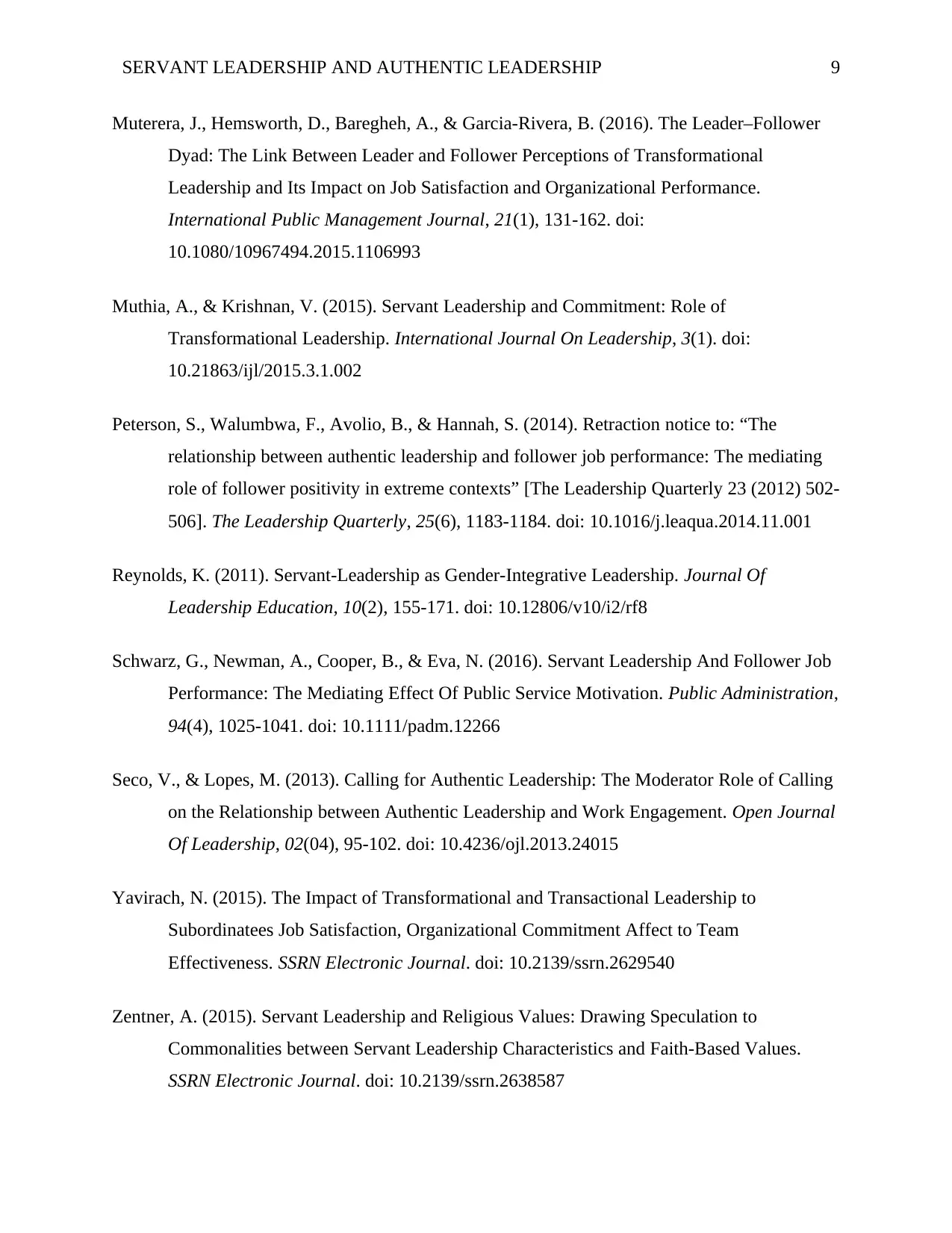
SERVANT LEADERSHIP AND AUTHENTIC LEADERSHIP 9
Muterera, J., Hemsworth, D., Baregheh, A., & Garcia-Rivera, B. (2016). The Leader–Follower
Dyad: The Link Between Leader and Follower Perceptions of Transformational
Leadership and Its Impact on Job Satisfaction and Organizational Performance.
International Public Management Journal, 21(1), 131-162. doi:
10.1080/10967494.2015.1106993
Muthia, A., & Krishnan, V. (2015). Servant Leadership and Commitment: Role of
Transformational Leadership. International Journal On Leadership, 3(1). doi:
10.21863/ijl/2015.3.1.002
Peterson, S., Walumbwa, F., Avolio, B., & Hannah, S. (2014). Retraction notice to: “The
relationship between authentic leadership and follower job performance: The mediating
role of follower positivity in extreme contexts” [The Leadership Quarterly 23 (2012) 502-
506]. The Leadership Quarterly, 25(6), 1183-1184. doi: 10.1016/j.leaqua.2014.11.001
Reynolds, K. (2011). Servant-Leadership as Gender-Integrative Leadership. Journal Of
Leadership Education, 10(2), 155-171. doi: 10.12806/v10/i2/rf8
Schwarz, G., Newman, A., Cooper, B., & Eva, N. (2016). Servant Leadership And Follower Job
Performance: The Mediating Effect Of Public Service Motivation. Public Administration,
94(4), 1025-1041. doi: 10.1111/padm.12266
Seco, V., & Lopes, M. (2013). Calling for Authentic Leadership: The Moderator Role of Calling
on the Relationship between Authentic Leadership and Work Engagement. Open Journal
Of Leadership, 02(04), 95-102. doi: 10.4236/ojl.2013.24015
Yavirach, N. (2015). The Impact of Transformational and Transactional Leadership to
Subordinatees Job Satisfaction, Organizational Commitment Affect to Team
Effectiveness. SSRN Electronic Journal. doi: 10.2139/ssrn.2629540
Zentner, A. (2015). Servant Leadership and Religious Values: Drawing Speculation to
Commonalities between Servant Leadership Characteristics and Faith-Based Values.
SSRN Electronic Journal. doi: 10.2139/ssrn.2638587
Muterera, J., Hemsworth, D., Baregheh, A., & Garcia-Rivera, B. (2016). The Leader–Follower
Dyad: The Link Between Leader and Follower Perceptions of Transformational
Leadership and Its Impact on Job Satisfaction and Organizational Performance.
International Public Management Journal, 21(1), 131-162. doi:
10.1080/10967494.2015.1106993
Muthia, A., & Krishnan, V. (2015). Servant Leadership and Commitment: Role of
Transformational Leadership. International Journal On Leadership, 3(1). doi:
10.21863/ijl/2015.3.1.002
Peterson, S., Walumbwa, F., Avolio, B., & Hannah, S. (2014). Retraction notice to: “The
relationship between authentic leadership and follower job performance: The mediating
role of follower positivity in extreme contexts” [The Leadership Quarterly 23 (2012) 502-
506]. The Leadership Quarterly, 25(6), 1183-1184. doi: 10.1016/j.leaqua.2014.11.001
Reynolds, K. (2011). Servant-Leadership as Gender-Integrative Leadership. Journal Of
Leadership Education, 10(2), 155-171. doi: 10.12806/v10/i2/rf8
Schwarz, G., Newman, A., Cooper, B., & Eva, N. (2016). Servant Leadership And Follower Job
Performance: The Mediating Effect Of Public Service Motivation. Public Administration,
94(4), 1025-1041. doi: 10.1111/padm.12266
Seco, V., & Lopes, M. (2013). Calling for Authentic Leadership: The Moderator Role of Calling
on the Relationship between Authentic Leadership and Work Engagement. Open Journal
Of Leadership, 02(04), 95-102. doi: 10.4236/ojl.2013.24015
Yavirach, N. (2015). The Impact of Transformational and Transactional Leadership to
Subordinatees Job Satisfaction, Organizational Commitment Affect to Team
Effectiveness. SSRN Electronic Journal. doi: 10.2139/ssrn.2629540
Zentner, A. (2015). Servant Leadership and Religious Values: Drawing Speculation to
Commonalities between Servant Leadership Characteristics and Faith-Based Values.
SSRN Electronic Journal. doi: 10.2139/ssrn.2638587
⊘ This is a preview!⊘
Do you want full access?
Subscribe today to unlock all pages.

Trusted by 1+ million students worldwide
1 out of 9
Related Documents
Your All-in-One AI-Powered Toolkit for Academic Success.
+13062052269
info@desklib.com
Available 24*7 on WhatsApp / Email
![[object Object]](/_next/static/media/star-bottom.7253800d.svg)
Unlock your academic potential
Copyright © 2020–2026 A2Z Services. All Rights Reserved. Developed and managed by ZUCOL.





